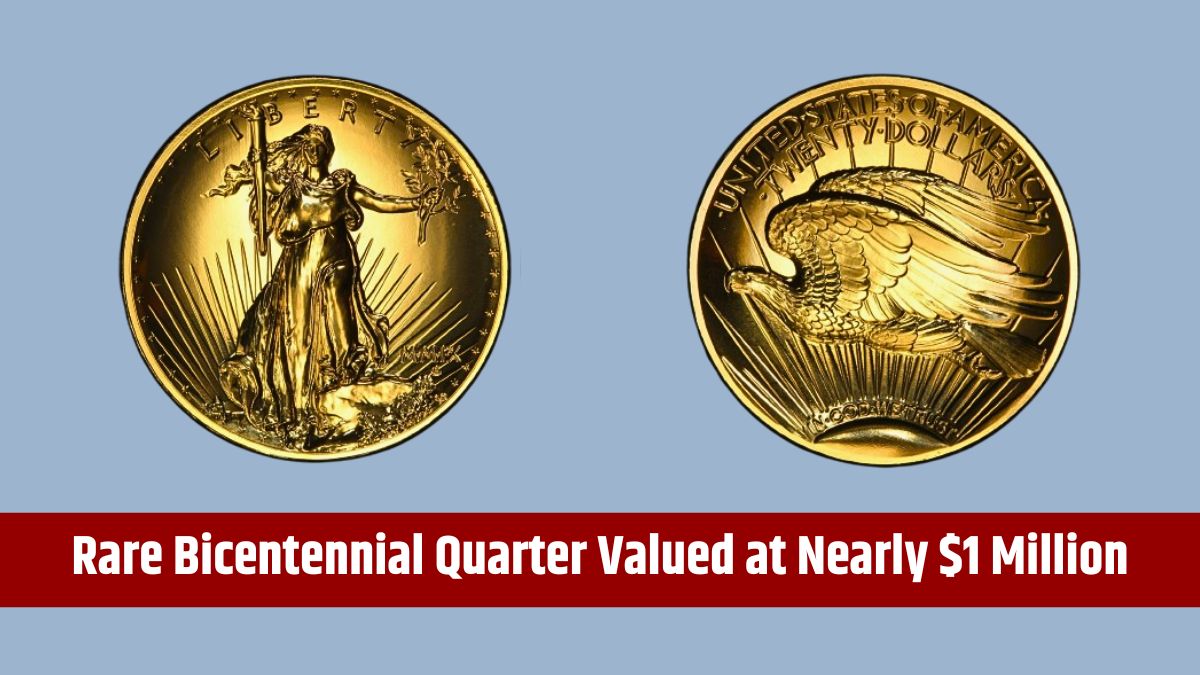The realm of coin collecting is filled with hidden treasures, where small pieces of history can fetch fortunes far beyond their face value. Among these treasures, the Bicentennial Quarter stands out, not only for its historical significance but also for its astounding value. This article cuts into the story of this rare quarter and six other coins worth more than $30 million, unveiling the intriguing and lucrative world of numismatics.
Bicentennial Quarter
The Bicentennial Quarter was released in 1976 to commemorate the 200th anniversary of American independence. While most quarters are only worth their face value, a rare version made of 40% silver with a special mint mark can be valued at nearly $1 million. This exceptional value is due to limited production, historical significance, and mint condition. The coin’s design features a drummer boy and a torch surrounded by 13 stars, representing the original colonies, making it highly prized by collectors.
Flowing Hair Dollar
The Flowing Hair Silver/Copper Dollar, minted in 1794 and 1795, holds the distinction of being one of the first dollar coins ever issued by the U.S. federal government. Valued at over $30 million, its worth is driven by its historical importance and extreme rarity. The coin depicts Lady Liberty on one side and an eagle on the other, symbolizing the ideals of the newly formed nation. Its age, unique design, and the few surviving specimens contribute to its significant value.
Double Eagle
The 1933 Double Eagle, with a face value of $20, is now considered a $30 million treasure. Known for its exquisite design, featuring Liberty striding forward and an eagle in flight, this coin’s value is also tied to its mysterious past. Most of these coins were melted down during the Great Depression, with only a handful surviving, leading to legal battles and adding to its mystique. The rarity and history make it one of the most sought-after coins in the world.
Brasher Doubloon
Minted in 1787 by goldsmith Ephraim Brasher, the Brasher Doubloon is often regarded as America’s first gold coin. It carries a value exceeding $30 million due to its rarity and historical significance, as it predates the establishment of the U.S. Mint. Brasher’s petition to mint his own coins, coupled with the coin’s gold content and craftsmanship, further enhances its value. The detailed design and backstory make it a top item among collectors.
Saint-Gaudens Double Eagle
The Saint-Gaudens Double Eagle, minted in 1907, is celebrated as one of the most beautiful coins in U.S. history. Designed by renowned sculptor Augustus Saint-Gaudens at the request of President Theodore Roosevelt, the coin features intricate details and high relief. It depicts Liberty holding a torch and olive branch on one side, with an eagle soaring on the reverse. Valued at over $30 million, this masterpiece is a testament to artistry and historical significance.
Liberty Head Nickel
The 1913 Liberty Head Nickel is an extraordinary coin worth over $30 million. This coin is unique because it was produced in a year when no nickels were supposed to be minted, making it an accidental treasure. With only five known examples, its rarity significantly boosts its value. The coin features the head of Liberty on one side and a Roman numeral V for five cents, surrounded by stars on the other, adding to its charm and collectible status.
Edward III Florin
The Edward III Florin, minted in 1343, is a rare medieval gold coin valued at over $30 million. Its historical significance lies in its status as one of the earliest gold coins produced in England, and its rarity enhances its appeal among collectors. The coin features the royal seal of King Edward III, representing a period when gold coins were valuable and scarce. Its limited number of surviving examples makes it a highly coveted piece of medieval history.
| Coin | Year | Value | Distinction |
|---|---|---|---|
| Bicentennial Quarter | 1976 | $1 million | Commemorates 200 years of U.S. independence |
| Flowing Hair Dollar | 1794/1795 | Over $30 million | One of the first U.S. dollar coins |
| Double Eagle | 1933 | Over $30 million | Rare survivors due to melting during Depression |
| Brasher Doubloon | 1787 | Over $30 million | America’s first gold coin, handcrafted |
| Saint-Gaudens Double Eagle | 1907 | Over $30 million | Famous for exquisite design |
| Liberty Head Nickel | 1913 | Over $30 million | Accidental minting, only five known pieces |
| Edward III Florin | 1343 | Over $30 million | Medieval gold coin with historical significance |
Coin collecting is more than just a hobby; it is a fascinating journey through history, art, and value. While most coins won’t make anyone a millionaire, discovering a rare gem like those mentioned above could turn a modest collection into a treasure trove. Each of these coins represents a piece of history that has endured through time, becoming not just a collectible, but a legacy.
FAQs
Why is the Bicentennial Quarter so valuable?
A rare version made of 40% silver and limited production boosts its worth.
What makes the 1933 Double Eagle unique?
Most of these coins were melted during the Great Depression, making surviving examples extremely rare.
How many Liberty Head Nickels exist?
There are only five known specimens in existence.
What is the significance of the Flowing Hair Dollar?
It is one of the first official U.S. dollar coins, minted in 1794 and 1795.
Who crafted the Brasher Doubloon?
It was created by goldsmith Ephraim Brasher before the U.S. Mint was established.







